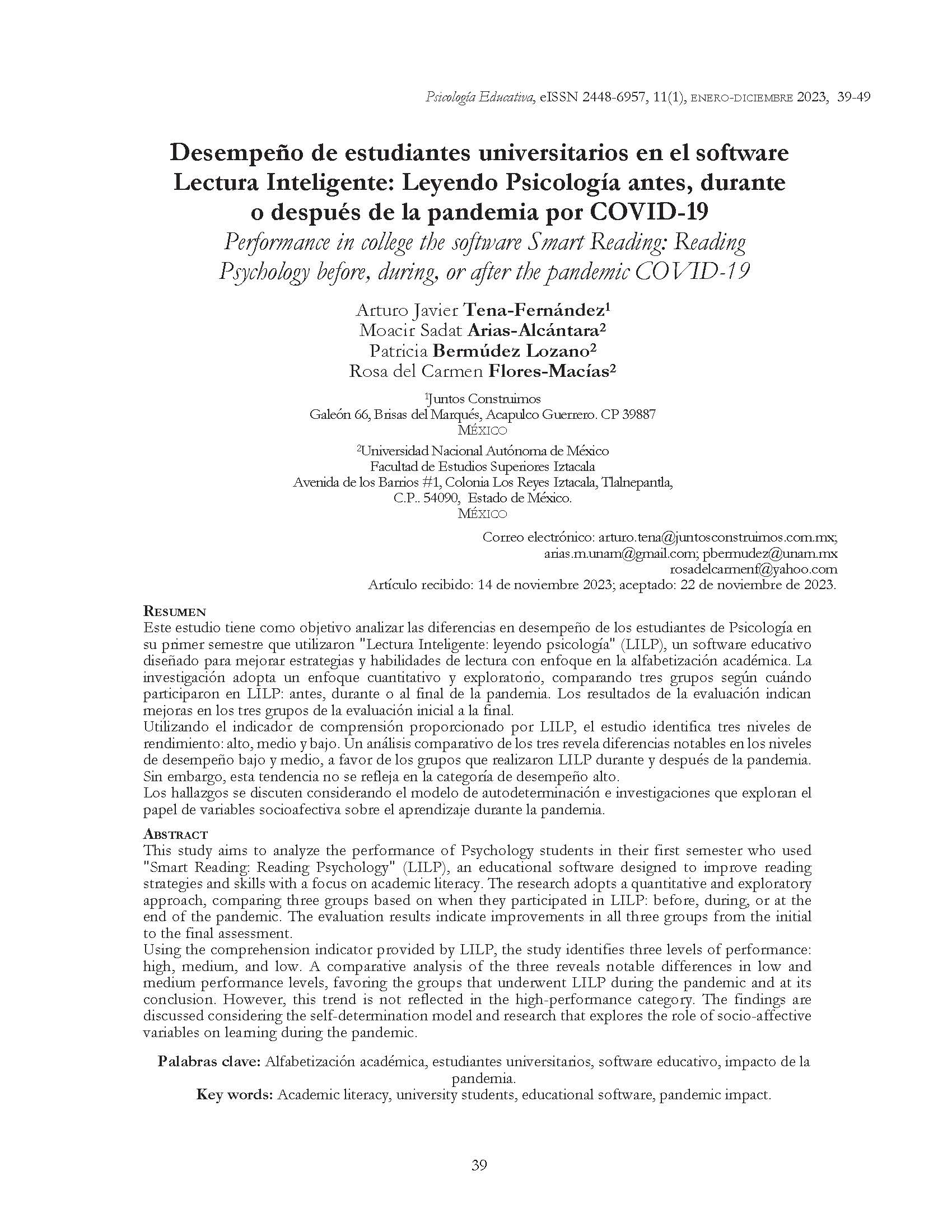Abstract
This study aims to analyze the performance of Psychology students in their first semester who used "Smart Reading: Reading Psychology" (LILP), an educational software designed to improve reading strategies and skills with a focus on academic literacy. The research adopts a quantitative and exploratory approach, comparing three groups based on when they participated in LILP: before, during, or at the end of the pandemic. The evaluation results indicate improvements in all three groups from the initial to the final assessment.
Using the comprehension indicator provided by LILP, the study identifies three levels of performance: high, medium, and low. A comparative analysis of the three reveals notable differences in low and medium performance levels, favoring the groups that underwent LILP during the pandemic and at its conclusion. However, this trend is not reflected in the high-performance category. The findings are discussed considering the self-determination model and research that explores the role of socio-affective variables on learning during the pandemic.
References
Alcalá, V., Robles, A., Cerna, D. (22 a 26 de noviembre de 2016). Resultados preliminares sobre el seguimiento del curso de lectura inteligente: Leyendo Psicología. Séptimo Encuentro Nacional de Tutoría. Guanajuato, Universidad de Guanajuato, noviembre. https://oa.ugto.mx/resultados-preliminares-sobre-el-seguimiento-del-curso-de-lectura-inteligente-leyendo-psicologia.html
Boxuan Ma, Min Lu y Shin’ichi Konomi (2021). Understanding student slide reading patterns during the pandemic. Proceedings of the 18th International Conference on Cognition and Exploratory Learning in Digital Age (CELDA 2021). En línea, octubre 13-15, 2021, International Association for Development of the Information Society, pp. 87-94. ERIC - ED621549 - Understanding Student Slide Reading Patterns during the Pandemic, International Association for Development of the Information Society, 2021
Carlino, P. (2013). Alfabetización académica diez años después. Revista Mexicana de Investigación Educativa, 18(57), 355-381. http://www.scielo.org.mx/scielo.php?script=sci_arttext&pid=S1405-66662013000200003&lng=es&tlng=es.
Cassany, D. & Morales, O. (2009). Leer y escribir en la universidad: Los géneros científicos, en Cassany, D. (editor) Para ser letrados (109-128). Barcelona: Paidós.
Castro A. L. (2022). Eficacia de implantación del programa Lectura Inteligente: Leyendo Psicología. Informe de evaluación. Tesis de maestría, Facultad de Psicología, Universidad Nacional Autónoma de México. Repositorio tesiunam
Deci, E. L., & Ryan, R. M. (2008). Facilitating optimal motivation and psychological well-being across life's domains. Canadian Psychology / Psychologie canadienne, 49(1), 14–23. https://doi.org/10.1037/0708-5591.49.1.14
Flores-Macías R. (2021). Leyendo psicología: Prácticas letradas en la formación profesional. En C. Santoyo y L. Colmenares (comp.) Patrones de habilidades metodológicas y conceptuales de análisis, planeación, evaluación e intervención en ciencias del comportamiento (pp 35-56). Universidad Nacional Autónoma de México. Facultad de Psicología
Flores-Macías, R. y Otero de Alba, A. (2016). Lectura inteligente: Leyendo psicología, un software educativo para apoyar la prevención del fracaso escolar. Congresos CLABES. https://revistas.utp.ac.pa/index.php/clabes/article/view/958
Gustiani, S. (2020). Student´s motivation in online learning during Covid-19 pandemic era. A case study. Holistics, 12(2) 23-40 https://www.jurnal.polsri.ac.id/index.php/holistic/article/download/3029/1235
Juntos Construimos (2021). Lectura Inteligente: De aprender a leer a leer para aprender. http://www.juntosconstruimos.com.mx/juntos-construimos-li.html)
Macay-Zambrano, M.E. y Véliz-Castro, M.E. (2019). Niveles en la comprensión lectora de los estudiantes universitarios. Polo del Conocimiento: Revista Científico - Profesional, 4(3), 401-415. https://dialnet.unirioja.es/servlet/articulo?codigo=7164280
Melchor Audirac, A., Hernández Zúñiga, A. G., y Sánchez Sosa, J. J. (2021). Universitarios mexicanos: Lo mejor y lo peor de la pandemia de COVID-19. Revista Digital Universitaria, 22(3), mayo-junio. http://doi.org/10.22201/cuaieed.16076079e.2021.22.3.1
Mizrachi, D., Boustany, J., Kurbanoğlu, S., Doğan, G., Todorova, T., Vilar, P. (2016). The Academic Reading Format International Study (ARFIS): Investigating students around the world. En: Kurbanoğlu, S., et al. Information Literacy: Key to an Inclusive Society. ECIL 2016. Communications in Computer and Information Science, vol 676. Springer, Cham. https://doi.org/10.1007/978-3-319-52162-6_21
Naciones Unidas (2020). Informe COVID-19 CEPAL-UNESCO: La educación en tiempos de la pandemia de COVID 19. Comisión Económica para América Latina y el Caribe (CEPAL) y Oficina Regional de Educación para América Latina y el Caribe de la Organización de las Naciones Unidas para la Educación, la Ciencia y la Cultura (OREALC/UNESCO Santiago).
Otero de Alba, A. (2011). Un software educativo para la formación de lectores en secundaria. Tesis de maestría, Facultad de Psicología, Universidad Nacional Autónoma de México. Repositorio tesiunam.
Rahiem, M. D. (2021). Remaining motivated despite the limitations: University students’ learning propensity during the COVID-19 pandemic. Children and Youth Services Review, 120, 105802. https://doi.org/10.1016/j.childyouth.2020.105802
Secker, J., & Tilley, E. (2022). Students, academic reading and information literacy in a time of COVID. Journal of Information Literacy, 16(2), 69–79. https://eric.ed.gov/?id=EJ1374415
Vaca Uribe, J., y Hernández y Hernández, D. (2006). Textos en papel vs. textos electrónicos: ¿Nuevas lecturas? Perfiles educativos, 28(113), 106-128. http://www.scielo.org.mx/scielo.php?script=sci_arttext&pid=S0185-26982006000300006&lng=es&tlng=es.
Yapo, F., Tabiliran, J., Dagami, A., Navales, K., & Tus, J. (2021). The self-efficacy and academic motivation of the graduating college students during the COVID-19 pandemic in the Philippines. International Journal of Advance Research and Innovative Ideas in Education. DOI: 10.6084/m9.figshare.14784885.v1

This work is licensed under a Creative Commons Attribution-NonCommercial-NoDerivatives 4.0 International License.
Copyright (c) 2024 Universidad Nacional Autónoma de México


